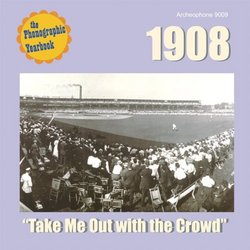| All Artists: Various Artists Title: 1908: Take Me Out with the Crowd Members Wishing: 2 Total Copies: 0 Label: Archeophone Original Release Date: 4/20/2004 Release Date: 4/20/2004 Genres: Folk, Pop, Rock, Classical Style: Vocal Pop Number of Discs: 1 SwapaCD Credits: 1 UPC: 777215106079 |
Search - Various Artists :: 1908: Take Me Out with the Crowd
 | Various Artists 1908: Take Me Out with the Crowd Genres: Folk, Pop, Rock, Classical
|
Larger Image |
CD Details |
CD ReviewsSocial Studies teachers, take note! F. Behrens | Keene, NH USA | 03/03/2005 (5 out of 5 stars) "There is a company called Archeophone Records out in St. Joseph, Illinois that has a wonderful specialty: searching out cylinders and acoustic 78-rpm recordings and transferring them to CDs. The company hopes that "once we get 25 or 30 of them finished, they will provide a comprehensive overview of popular music, politics, and culture of the late 19th and early 20th centuries." (Quoted from an e-mail sent to me by an Archeophone representative.) Their releases fall into at least three categories: the music of a particular person, of a particular style or era, and of a particular year. I have been reporting on these releases off and on, but this time I want to report on all of the CDs that so far make up the Phonographic Yearbook series. As of this writing these are the entries: "The 1890s, Volume 1: Wipe Him Off the Face of the Land" (9004), "The 1890s, Volume 2: Wear Yer Bran' New Gown" (9006), "1907: Dear Old Golden Rule Days" (9008), "1908: Take Me Out With the Crowd" (9009), "1912: Waitin' on the Levee" (9003), "1913: Come and See the Big Parade" (9005), "1920: Even Water's Getting Weaker" (9001A), "1921: Make Believe and Smile" (9002A), "1922: An Angel's Voice I Hear" (9007). Each CD is accompanied by a booklet crammed with information and photos of the times, the personalities, and the selections. Of course, the recordings from the 1890s come as through a sonic glass darkly; but enough is audible to give you the most important feature of these songs-the style in which they were first presented. This is something you can never get from modern renditions of these songs that were originally aimed at an audience that saw the universe quite differently than we do. Unfortunately, part of that world view was an ingrained intolerance to "others," and there are occasional references to ethnic groups that seem shocking today. But as Archeophone puts it in some of their liner notes, we cannot ignore the shameful parts of our history. We mustn't fall into that trap any more than we already have. Among the voices heard in this series that are still remembered by many today are those of Ada Jones, Harry Lauder, Billy Murray, Bert Williams, Alma Gluck, Louise Homer, Al Jolson, Ted Lewis, Nora Bayes, Eddie Cantor, and Fanny Brice. All the others were important forces in the development of the American popular song and you should get to know them in the best possible way: hearing them do their stuff into a microphone. Grab them all, especially you teachers and students of American history and American music. " Old music, fun listening J'Ess | Florida moving to Pennsylvania | 02/11/2007 (3 out of 5 stars) "Take me out with the crowd. Baseball, old times haven't charnged so much. People are still the same. Listen to the words of the songs and you'll see they had many of the same problems we have now. Good for history buffs."
|

 Track Listings (26) - Disc #1
Track Listings (26) - Disc #1